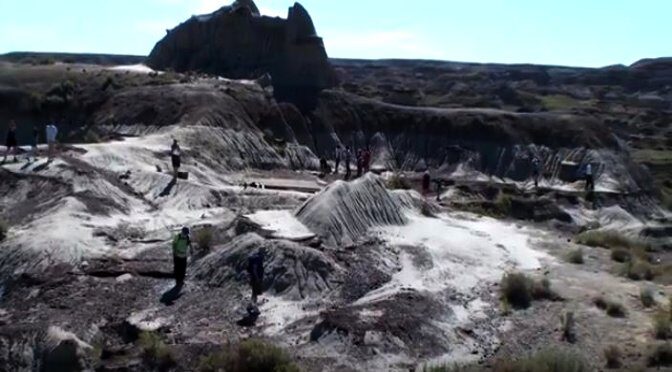A team of paleontologists have uncovered a site in the Canadian province of Alberta that contains hundreds of dinosaur fossils, all from the same time period. The find is an essential collection as one of the most significant paleontological discoveries in recent years.
The team is led by Dr. Jordan Mallon, a world-leading paleobiologist who works for the Museum of Nature in Ottawa, and who believes there could be tens of thousands of individual dinosaurs on the site. Their aim is to uncover the full set of bones that are present in the ‘graveyard’ and to try to piece together what could have led to a mass death on this scale.
The Discovery

Although a campsite on a grassy prairie, surrounded by old farm buildings doesn’t immediately strike you as the type of place that would be a hotspot for dinosaurs; the landscape and weather are significantly different than they would have been 65 million years ago.
The small town of Hilda, where the site is situated, would have been filled with lush vegetation, pterosaurs (flying dinosaurs) and crocodiles. The weather would have been hotter and much more volatile than it is today, with regular, violent storms hitting the region.
The fossils that found by Dr. Mallon and his team have largely been from one species, centrosaurines. The centrosaurus was a horned herbivore, with a rhino-like horn and a bony frill. These social dinosaurs, clearly moved in large herds, which explains why there is such a significant number of them in the same spot.
Discovering just one species of dinosaur at the site proves to Dr. Mallon’s team that the bones must have been left at the same time, rather than accumulated over a longer period. ‘It seems to have been from a single event,’ Dr. Mallon explains. ‘We’re talking about tens of thousands of individuals dying at once, it would have been an epic disaster.’ Although what exactly the disaster was is still open for debate.
This study is by no means the first at the site. It was originally discovered in 1950 by the celebrated paleontologist Wann Langston Jr. and has occasionally been researched ever since. However, Dr. Mallon’s decision to revisit the site in 2013 led to the discovery of the centrosaurus graveyard. Previously it had been believed that there were only a few fossils in the area.
Such an assumption is hard to explain because the area is a near-perfect place for preserving animal bones in fossil. The massive flow of sediment that was rolling off the Rockies into the lowland areas of Alberta, when they first formed around 80 million years ago ensured the near immaculate preservation of the bones.
‘You ended up with pretty much the perfect conditions for dinosaurs to be preserved,’ said Jon Noad, a geologist and consultant based in Calgary who has studied the region.
It was these perfect conditions that brought Dr. Mallon back, as he attempts to piece together the life stories of the long-dead animals that he studies. Such a huge number of dinosaurs of the same species is an essential collection for scientists who try to understand the life cycles and behavior of a species. ‘You can learn about how these animals changed as they grew up, about the differences between males and females. You can learn about the population structure of the herd,’ Mallon said.
For anyone interested in dinosaurs and the history of life on earth it is unlikely that this is the last you will hear about the town of Hilda.
This article was written by The Hearty Soul. The Hearty Soul is a rapidly growing community dedicated to helping you discover your most healthy, balanced, and natural life.
Sources:
http://www.theglobeandmail.com/news/national/alberta-fossil-site-hints-to-epic-disaster-for-group-of-dinosaurs/article31219826/
Image Sources:
https://www.youtube.com/watch?v=wfguXl9tou4
https://www.youtube.com/watch?v=0RHTHJOupss












